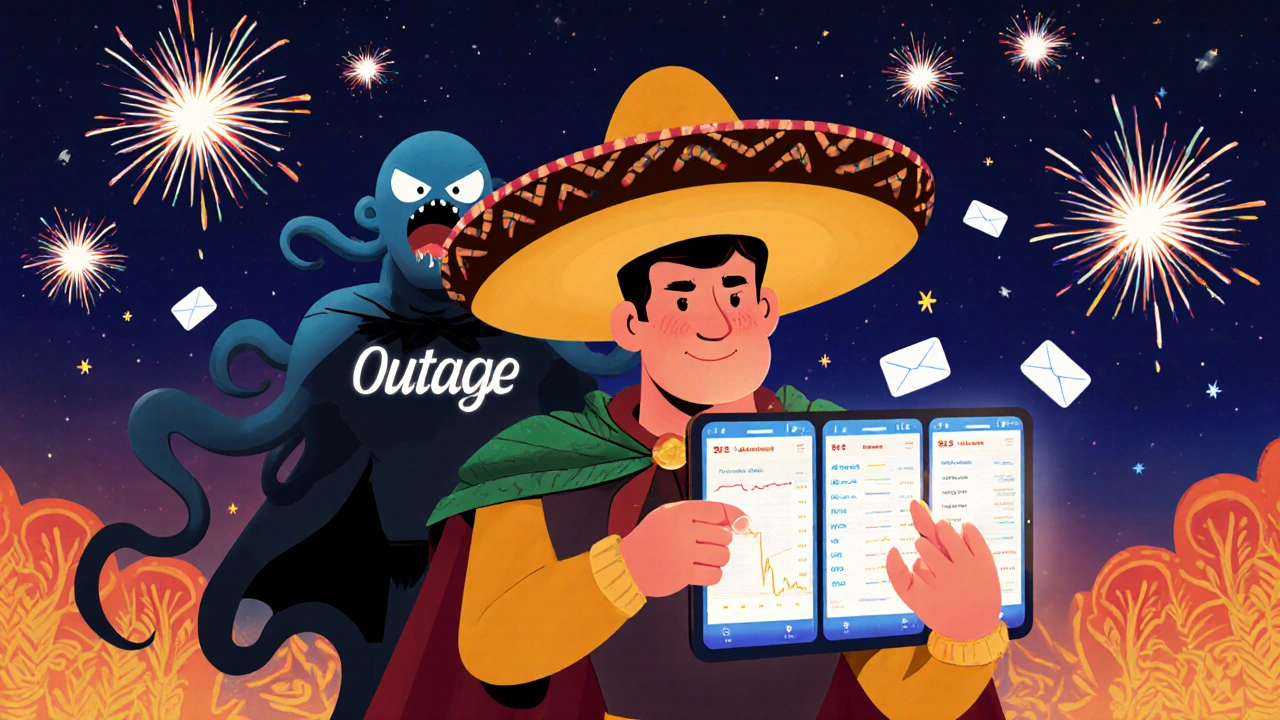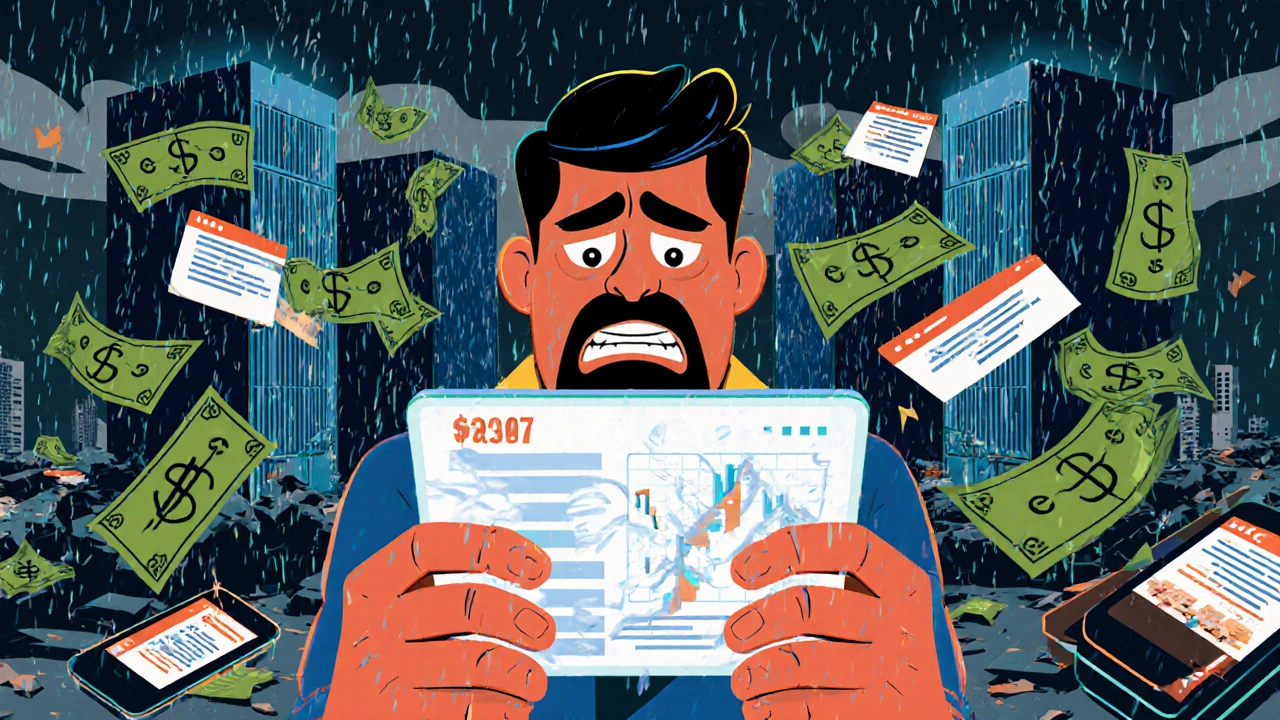Broker Outage Reliability Calculator
How Prepared Are You for a Broker Outage?
This calculator assesses your readiness for broker platform outages based on your current setup and preparedness measures. Outages can cost you up to 7.2% more in losses, but proper preparation can help you avoid costly mistakes.
Assess Your Broker's Reliability
Your Outage Preparedness Score
Risk Assessment
When your trading platform crashes during a market plunge, you’re not just watching your portfolio drop-you’re powerless to act. That’s not paranoia. It’s reality. On August 5, 2024, Charles Schwab’s platform went dark for over two hours while the Dow dropped 1,000 points. Thousands of investors saw their stop-loss orders fail, their buy signals ignored, and their apps freeze. No phone lines. No web access. No alerts. Just silence as money vanished before their eyes.
These aren’t rare glitches. They’re systemic. According to IOSCO’s 2024 report, broker outages have surged since 2020, with 217 reported incidents in Q2 alone. The problem? Legacy systems built for 50,000 users now handle over 15 million daily trades. When volatility spikes, the infrastructure cracks. And when it does, retail investors pay the price-on average, 7.2% more in losses than those who could trade.
Why Broker Outages Keep Happening
It’s not magic. It’s math. Sixty-eight percent of outages stem from software bugs, not hackers or cyberattacks. A single faulty line of code in an order routing system can crash an entire platform. Hardware failures make up 27%-old servers overheating under load, network switches failing under traffic spikes. The rest? A mix of both.
Most brokers still run on systems designed for a time when trading was slow, quiet, and mostly done on desktops. Today, mobile apps, algorithmic trades, and retail investors flooding in during market swings overwhelm these platforms. Vanguard’s CEO admitted their system buckled when volume hit 15 million trades in a day-three times normal. Fidelity’s 2020 outage lasted nearly five hours. That’s not a fluke. It’s design.
And regulators are catching on. FINRA fined two major brokers $4.2 million in 2023 for repeated outages. The SEC now requires real-time monitoring of 147 performance metrics, quarterly stress tests simulating 500% volume spikes, and biannual disaster drills. But compliance doesn’t equal reliability. Only 22% of brokers meet IOSCO’s recommended infrastructure standards. The rest are playing Russian roulette with your money.
What Happens When the Platform Goes Down
You think you can just wait it out. You can’t.
When the app freezes:
- Your stop-loss orders don’t trigger. If your stock drops 10%, you’re stuck with it.
- Market orders become useless. Even if you hit "Buy," the system may not process it until hours later.
- Emergency phone lines are overloaded. Wait times hit 20 minutes-or longer.
- Settlement rules don’t bend. A trade placed after 4 p.m. ET counts as next day’s trade. You miss the window.
- Phishing emails flood in. Scammers send fake outage alerts with links to steal your login. One in three users fell for them in 2024.
And the emotional toll? Real. A KlaymanToskes survey found 63% of affected investors experienced panic, anxiety, or rage during outages. That’s not just stress-it’s financial trauma.
Interactive Brokers, with its 4.3/5 reliability rating on Trustpilot, is the exception. Why? They’ve invested in redundant servers, API-based failovers, and real-time status dashboards. Most others haven’t. And that’s your risk.

How to Prepare Before the Next Outage
You can’t prevent a broker outage. But you can prevent it from costing you money.
1. Have at least two brokerage accounts
Investors with accounts at three or more brokers saw 78% fewer trading limitations during outages, according to Mortgage Connector’s 2024 analysis. Spread your assets. Don’t put everything in one place. If Schwab goes down, you can still trade on Fidelity or TD Ameritrade. Even if you only use one for active trading, keep a small balance in another just for emergencies.
2. Turn on SMS outage alerts
Ninety-two percent of major brokers offer SMS notifications for platform status. Enable them. Don’t wait for your app to crash. Get a text: "Platform experiencing delays. Check status page." That’s your cue to switch accounts or call support.
3. Know your broker’s emergency phone process
Only 67% offer phone trading. But if yours does, memorize the number. Practice calling during normal hours. Ask: "How long is the current wait time?" "Do you handle market orders?" "Can you cancel a pending stop-loss?" Write it down. You won’t think clearly when panic hits.
4. Set up standing transfers to a separate account
If you’re worried about a crash during a market drop, automate transfers to a cash account at another institution. That way, even if you can’t sell, you’ve already moved some capital out of harm’s way.
5. Bookmark the official status page
Brokers like Zerodha and FYERS publish real-time uptime dashboards. FYERS’ dashboard, launched in July 2024, cut customer complaints by 31%. If your broker doesn’t have one, demand it. Or switch.
What to Do When the Platform Is Down
You’re in the middle of a crash. Your app won’t load. What now?
- Don’t panic. Don’t refresh. Don’t spam the login button. That just adds load and makes it worse.
- Check the official status page. If it says "All Systems Operational," the problem is your device or internet. Try a different browser or device.
- Turn on SMS alerts. If you haven’t already, you’re too late. But if you have, you’ll know if it’s a full outage or just a slow server.
- Call your broker. Use the emergency number. Be ready to give your account number, SSN, and security answers. Have them ready before you call.
- Switch to your backup broker. Log in. Check your positions. If you can trade, act. Don’t wait for the first platform to come back.
- Don’t trust emails or texts claiming to fix the outage. Phishing spiked 40% during the 2024 outages. Always go to the official website-never click links.
And remember: if you couldn’t trade, you didn’t lose money-you lost opportunity. That’s different. But it still hurts.

What’s Changing in 2025 and Beyond
Regulators aren’t waiting anymore. The SEC is finalizing new rules for Q1 2025 that will require all U.S. brokers to maintain failover systems capable of handling 1,000% volume spikes. The EU already has this rule. If you’re trading with a U.S. broker, expect upgrades by mid-2025.
Technology is catching up, too. Fidelity is piloting blockchain-based order routing to bypass traditional systems during outages. TradeStation’s 99.99% uptime since 2021 proves it’s possible. AI-powered predictive maintenance-used by top tech firms-is coming to brokers. Deloitte predicts it will cut outages by 65% by 2027.
But here’s the hard truth: if your broker hasn’t upgraded since 2019, they’re not ready. And if they haven’t told you they’re upgrading, they’re hiding it.
Final Advice: Protect Yourself, Not Just Your Portfolio
Trading isn’t just about picking stocks. It’s about having a plan for when everything breaks.
Most people treat their broker like a bank-stable, reliable, always there. But brokers aren’t banks. They’re tech companies that happen to handle your money. And tech fails.
Don’t wait for the next crash to learn this lesson. Set up your backup accounts now. Enable SMS alerts. Know your emergency number. Test your backup platform. Spend eight hours this month preparing for a scenario you hope never happens. It’s the only thing that will keep you from losing money when the system fails.
Because when the platform goes down, the market doesn’t pause. And if you’re not ready, you’re not investing-you’re gambling.
What should I do if my brokerage platform crashes during market hours?
First, stop refreshing the app-it can make the outage worse. Check the broker’s official status page or enable SMS alerts. If the platform is down, switch to a backup brokerage account if you have one. Call your broker’s emergency phone line-have your account details ready. Avoid clicking on any emails or texts claiming to fix the issue; they’re often phishing scams. If you can’t trade, don’t panic-your losses are limited to missed opportunities, not actual losses unless you held positions without stop-losses.
Are broker outages covered by insurance?
No. Brokerage firms are not required to insure against platform outages. SIPC protects against the loss of cash and securities if a broker goes bankrupt-but not if their system fails. If you miss a trade because the app is down, you can’t claim compensation. That’s why having multiple accounts and emergency plans is critical. Regulatory fines are paid by the broker, not reimbursed to you.
Can I trade over the phone during an outage?
Sixty-seven percent of major U.S. brokers offer phone trading as a backup. But don’t assume it’s fast. Wait times can be 15 to 30 minutes during high-volume outages. Only use this if you have no other option. Practice calling during normal hours to learn the process. Ask if they handle market orders, stop-losses, and limit orders. Not all phone reps can execute complex trades.
How do I know if an outage alert is real or a scam?
Never click links in emails or texts about outages. Legitimate brokers will never ask you to log in via a link. Check the official website directly by typing the URL yourself. Look for a status page-most top brokers like Fidelity, Interactive Brokers, and Zerodha have one. If you’re unsure, call the broker using the number on their official website, not the one in the message. In 2024, 34% of users fell for fake outage emails.
Which brokers have the best uptime records?
Interactive Brokers leads with a 4.3/5 reliability rating on Trustpilot, based on over 1,800 outage reviews. TradeStation has maintained 99.99% uptime since 2021. Zerodha and FYERS, while smaller, are praised for transparent outage reporting and real-time status dashboards. Avoid brokers with no public uptime data or frequent complaints on Trustpilot or Reddit. If a broker doesn’t publish outage reports, they’re not being transparent-and that’s a red flag.
Should I switch brokers because of outages?
If your broker has had repeated outages during market volatility and offers no transparency or backup options, yes. Your trading experience matters more than low fees. A broker with slightly higher commissions but 99.9% uptime is worth more than a free platform that crashes when you need it most. Consider moving at least part of your portfolio to a more reliable broker. You don’t need to move everything-just enough to give you a fallback during critical moments.

Astha Mishra
November 14, 2025 AT 17:40It's funny how we treat brokerage platforms like they're sacred temples of finance-unbreakable, eternal, infallible. But they're just code. Just servers. Just someone's weekend project scaled to millions. We forget that behind every 'Buy' button is a 2008-era architecture trying to handle 2024's chaos. And yet, we blame ourselves when it fails. Not the engineers. Not the board. Not the regulators who let this slide for a decade. We just sigh, refresh, and pray. Maybe the real investment isn't in stocks-it's in redundancy. In having a backup account you check once a year just to make sure it still works. Like a fire extinguisher you never use until the house is burning. Then you realize-you didn't prepare. You just hoped.
Kenny McMiller
November 15, 2025 AT 13:43Brokers are legacy tech garbage. Full stop. The fact that we're still relying on monolithic systems built for dial-up-era volumes while retail traders are spamming apps with algo bots and meme stocks is absurd. They're running on Cobol with a React frontend glued on like duct tape. And don't get me started on 'phone trading'-like, you want me to verbally scream 'BUY AAPL AT MARKET' to some dude in a call center who's reading from a script written in 2012? Meanwhile, IBKR's API is already routing orders through three redundant data centers while you're still waiting for your app to load. If your broker doesn't have a public status page with sub-second latency updates, you're not investing-you're volunteering as a beta tester for their tech debt.
Dave McPherson
November 16, 2025 AT 17:59